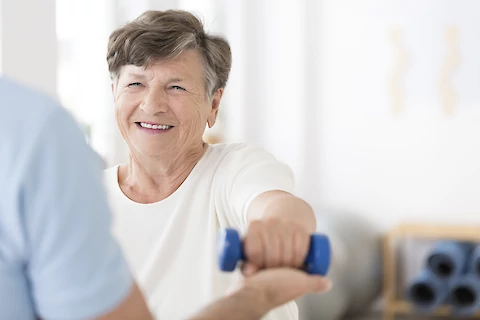
Our bodies undergo many changes as we age, and the health of our bones is no exception. Understanding these changes is important for seniors, especially when dealing with conditions like osteoporosis—a disease that affects millions of seniors worldwide.
This Senior Helpers blog post provides seniors with a manageable strategy to maintain strong bones and overall health whether living with osteoporosis or simply wanting to strengthen their bone health. We will delve into what osteoporosis is, how it impacts a senior's life, and offer practical advice to help ease the way.
Understanding Osteoporosis in Seniors
In simple terms, osteoporosis is a bone disease characterized by a decrease in bone strength. This, in turn, makes bones more likely to break. This condition is particularly prevalent among the senior population and can transform simple falls or minor injuries into serious health threats. The most common affected areas include the spine, hip, and wrist.
Practical Advice for Dealing With Osteoporosis
Dealing with osteoporosis is often just a matter of making healthy lifestyle decisions. Here are a few proactive things seniors with osteoporosis can do.
1. Choose an Osteoporosis-Friendly Diet
An osteoporosis-friendly diet should be rich in calcium and vitamin D which are essential nutrients for bone health. Seniors should incorporate foods like dairy products, green leafy vegetables, and fatty fish into their meals.
2. Get the Body Moving
Regular, gentle exercise can make all the difference. Seniors should engage in weight-bearing activities like walking or dancing. Balance and flexibility exercises like yoga or Tai Chi can also help reduce the risk of falls. However, it is always a good idea to talk to a healthcare provider before starting any new exercise routine.
3. Take Helpful Supplements
Supplements can also play a role in managing osteoporosis in seniors. Generally, calcium and vitamin D supplements can be beneficial, but it is important to consult healthcare providers before starting a new supplement regime. Supplements are not a substitute for a healthy diet but they can fill in nutritional gaps.
Prevention Strategies for Osteoporosis
Preventing osteoporosis in seniors involves more than just diet and exercise. Lifestyle changes like quitting smoking and reducing alcohol consumption can significantly lower their chances of developing this disease. Regular health check-ups and screenings are also essential in detecting early signs of bone loss. Some seniors might also need medication as part of their prevention or treatment plan, so it is essential to discuss this with their doctor.
Manageability of Maintaining Strong Bones
While the information above may seem overwhelming, maintaining strong bones and overall health is more manageable than you might think. The strategies we have discussed can easily be incorporated into seniors' daily routines. Remember, taking care of seniors' overall health is just as important. Everything is interconnected, and a healthy body promotes healthy bones.
Senior Helpers Can Help Manage Osteoporosis
Senior Helpers offers comprehensive, in-home senior care services designed to meet the specific needs of our senior communities. If you need help with managing osteoporosis or other aspects of senior health, click here to find a Senior Helpers location near you. We are here to help you age well and maintain strong bones and an overall healthy lifestyle.